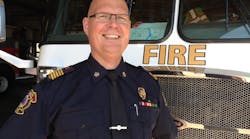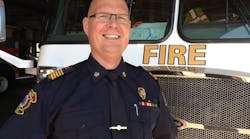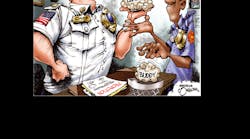At times I think we can over complicate leadership. This is not to say that understanding motivational and leadership theories isn't important, because it is, but overcomplicating leadership can minimize our leadership effectiveness. And, there is little doubt that today's fire service leader must be effective in everything he or she does because that is what is expected from them.
I would suggest that there is more pressure on fire service leaders today, then any other time in our history. The pressures of leading when budgets are getting trimmed, greater expectations from our communities to deliver emergency services that we don't have the resources for, and making sure that morale is high all the time are only a few of the existing pressures being placed upon today's fire service leaders.
This pressure leads to stress and can impede leadership effectiveness.
It's been stated that reflection is good for the soul and since my retirement I have reflected upon my 32-year career. During these reflection periods, some common themes required for today's fire service leader kept coming up.
There are six things that can benefit today's fire service leader and help them lead effectively while facing today's increasing pressures.
1.Know your strengths - It is easy to identify personal strengths. You generally know what you are good at and what you excel at. After all, it's your strengths that generally got you to where you are today. Your strengths allow you to do things with confidence and when you are confident you are in a better position to move outside of your comfort zone. Given the zest for the profession that most firefighters have, a vital factor here is to be confident without crossing over into cockiness.
2. Know your weaknesses - Identifying our weaknesses is a different story. The problem here is that our egos stop us from peeling away the layers to identify our weaknesses. Who wants to focus on a weakness? Very few, and this can be a big problem for the fire service leader. Without identifying and understanding our weaknesses, we are creating self-limiting boundaries with our leadership growth because we can in some cases be the blind leading the blind. Knowing our weaknesses helps us become better fire service leaders as it opens the door for us to take the necessary measures to eliminate them.
3. Critical thinking - In Thought and Knowledge, An Introduction to Critical Thinking, Diane Halpern defines critical thinking as, "the term used to describe thinking that is purposeful, reasoned, and goal directed." It's easy to identify why these traits are crucial for the success of any fire service leader.
I would also add that critical thinking gives the leader a better understanding of the cause and effect of his decisions. If you ask me, this is exactly what we need from today's fire service leader because understanding cause and effect will help the leader identify which hill to die on. It's unfortunate, but in life good people can make some poor decisions and set the team up for failure. Critical thinking is a key ingredient for the successful fire service leader; remember…purposeful, reasoned, goal directed and understanding cause and effect.
4. Learn from your failures - We are complicated beings and we will make mistakes. The successful leaders are those that have learned from their mistakes. It's easy to get frustrated when mistakes are made, but it is from mistakes and failures where the real learning occurs. We must learn from them and never make them again so we can move forward into leadership growth.
5. Adjust to your demographics - Leadership is about relationships and without understanding what the Boomers, Gen-X and Gen-Y value; it's difficult to build solid relationships. We are all motivated differently or beat to a different drum, so understanding what motivates each generation is another factor to consider when leading through stressful times. Minimizing the importance of adjusting to your demographics will only create unnecessary leadership speed bumps.
6. Develop the team - A fire department grows when firefighters are given the opportunity to grow in the soft skills. Generally, the hard skills are the focus and this is a necessity for our profession, but the soft skills must be also be given a priority if we want to see firefighters of today become the leaders of tomorrow.
Let's face it, budget dollars are getting more difficult to secure and far too often the training budget takes a hit. What is often the case in training budget cuts is that the soft skill training is removed from the budget (if it's in there at all) because of the assumption that only the officers need the training. News flash here; the soft skills are just as important as the technical skills and every firefighter in the department must be part of this training.
Leadership in the fire service is not for the weak of heart. It really does require dedication, sacrifice and sheer determination to make the profession better.
It doesn't have to be complicated.

Les Karpluk
Les Karpluk began his career with the Prince Albert Fire Department in 1982 and worked his way up through the ranks. In 2006 he was promoted as the Fire Chief for the Prince Albert Fire Department. Les has certificates in fire service leadership and fire service administration through Dalhousie University, a bachelor of applied business: emergency services through Lakeland College and numerous other university courses.
Les has received numerous awards including: Prior of The Priory of Canada, Most venerable order of the Hospital of St. John of Jerusalem Serving Brother Medal and certificate (2002), Canadian Fire Services Exemplary Service Medal (2002), Chief Fire Officer Designation (Canadian Association of Fire Chiefs), 2005, Career Fire Chief of the Year (Canadian Association of Fire Chiefs), (2009) Saskatchewan Protective Services Medal (2010), Canadian Fire Services Medal for 30-years of Exemplary Service (2012) and the Queens Diamond Jubilee Medal (2013).
Les has been a speaker at numerous conferences across Canada and is a regular contributor to Fire Chief in Canada and Fire Fighting in Canada. He has authored and co-authored 60 articles and in addition to writing trade articles, he facilitates for Dalhousie University, Lakeland College and is currently the second vice president of the Canadian Association of Fire Chiefs.
You can contact Les at: [email protected].










